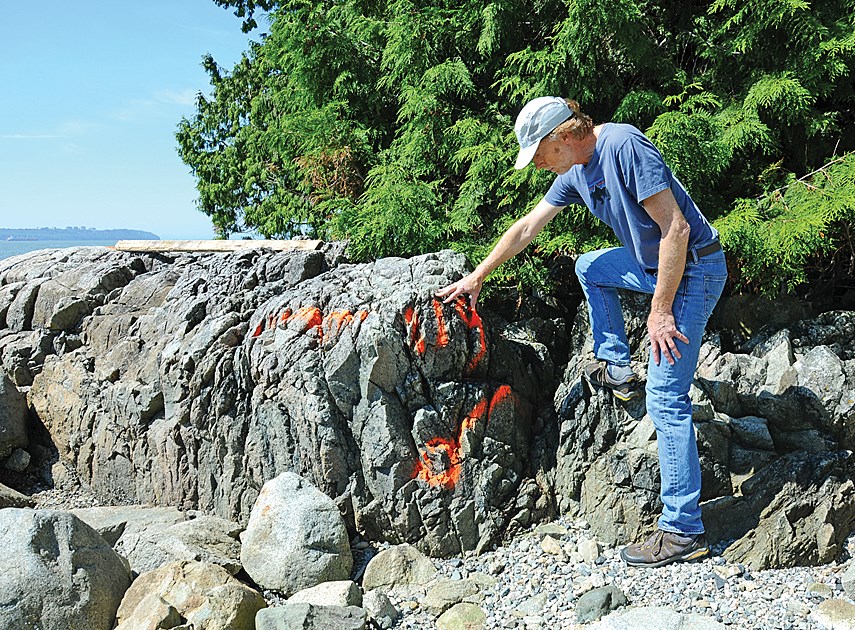Three protesters stood between a cedar tree and a water pipeline on a dead end street in West Vancouver Thursday morning, wondering if they’re willing to be arrested.
West Vancouver staff got the green light to seek a court injunction this week following a closed council meeting, according to district spokeswoman Donna Powers. The move is intended to facilitate an approximately $16-million stormwater pipeline linking the British Properties to the ocean. But in order to divert water from Pipe, Westmount, Cave, Turner, and Godman creeks, crews will need to tear up 31st Street and chop down a towering cedar tree and a Japanese maple along the route.
“Over my dead body,” pronounced neighbour Susan Bibbings. “I don’t even care if they come and arrest me. ...That doesn’t scare me as much as what we’re doing to the planet.”
Bibbings blocked the area with her car Thursday morning before being instructed to move.
“I said, ‘Well, you can move my car but I’m going to sit under the tree. Can’t move me,’” she said. “But I don’t know, maybe they can.”
The project schedule is tailored to the tides, according to Powers, who explained even a brief delay could lead to a one-year postponement.
For Bibbings, a mother of four, the project offers a stark decision: “Do we get arrested or do we move away and watch these beautiful trees get killed?” she asked. “I don’t know.”
“It’s ramming yet another infrastructure pipeline whether it’s bitumen or this,” she added.
Brian Finnie said he’s willing to be arrested although he hopes it won’t come to that.
Finnie’s parents, 90 and 85, have lived on 31st Street for 30 years. The pipeline trench will likely slice through their driveway.
“They don’t see themselves as owners,” he said. “They’re just caretaking this little slice of heaven.”
Finnie erected a sign on Marine Drive but is concerned speeding drivers may not see it. In knocking on doors he also encountered a lot of empty homes, Bibbings noted.
But once residents understand there will be traffic disruption and impact on the resale value of houses, Finnie said he’s hopeful the community will get involved.
Finnie accused municipal hall of a lack of transparency.
“Have other options been looked at? Has there been independent reviews? What’s it going to cost? And [municipal hall] had no answers,” Finnie said.
The district simply has no other options in this case, Powers said.
“We already have channel breach and erosion,” she said. “We’re talking about an area where past development has already created the risk.”
Detention ponds wouldn’t be viable because of the size and steepness of the area. And the alternative to tearing up roads would be tunnelling under private property.
“While many private property owners have encroached on public land, that’s just not an option for us. We have to colour between the lines.”
The need to chop trees is necessitated by the fact 31st Street functions as a utilities right of way with gas, cable and hydro, Powers said.
Bibbings blasted British Pacific Properties as a “classic corporate developer” profiting at the expense of the natural world. That characterization is unfair, Powers said, noting district costs are capped at $6.25 million with BPP assuming the financial risk.
“The taxpayers are benefiting hugely from them taking on this project,” she said.
Bibbings, a small business entrepreneur who once spearheaded a fair trade initiative designed to stop deforestation of Kilimanjaro’s rainforest, said she’s virtually stopped working in order to devote her energies to work against climate change.
“This might seem like a small thing around one tree, but to me it’s symbolic,” Bibbings said. “I’m an introvert; this is hard for me to do, but at a certain point you have to stand up for what’s right and your kids and life on this planet.”



